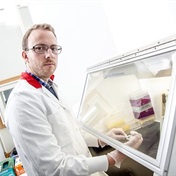But procedure is too risky, one expert counters
Stem cell transplants may hold some hope for patients with rapidly progressing multiple sclerosis, the authors of a long-term study report.
The controversial treatment, known as hematopoietic stem cell transplantation (HSCT), involves ablating, or removing, the patients' immune and other blood cells, then replacing it with new bone marrow stem cells from the same patient.
The idea is to "reset the thermostat and start fresh," said Dr Aaron Miller, chief medical officer for the National Multiple Sclerosis Society and a professor of neurology at Mount Sinai School of Medicine in New York City.
The study
But Miller, who was not involved in the study, doubts the procedure will become a viable option for patients with aggressive multiple sclerosis.
"This is a very heroic form of therapy for multiple sclerosis [MS], which is unlikely, in my view, ever to have a major impact on the field," added Miller. "It's a substantially risky therapy - the mortality rates have been in the 2-3% range and it's hugely expensive."
MS is a disease of the nervous system. There is no known cause or cure, and in severe cases patients may be unable to write, speak or walk.
This study, published in the 22 March issue of Neurology, was begun 15 years ago. Back then, "perhaps we didn't have other good alternatives for aggressive disease," he said. "I think we now have better and safer alternatives."
Alternatives
Those alternatives include the biologic therapies Tysabri (natalizumab) and Gilenya (fingolimod), approved in 2006 and 2010, respectively. But Miller emphasised these can only be considered "potentially" more effective than HSCT because the two have never been tested head-to-head.
The trial organisers reported earlier that 80% of patients receiving HSCT treatment had stabilised disease after five years. They also noted positive brain changes on an MRI.
Now, after 15 years, the authors report that overall 25% of the 35 initial patients are stabilised. The success rate was better – 44% - for those with active brain lesions, signalling aggressive disease, they found.
Many had a lessening of their disability, and fewer and smaller lesions in the brain.
The findings
But two participants, or 6%, died of complications from the transplant.
Research on this aggressive therapy is continuing, say the authors, from Aristotle University of Thessaloniki Medical School in Greece.
But more information might be hard to come by because the treatment's high mortality rate makes it difficult to recruit patients.
Still, they said, HSCT might be a "salvage" therapy for hard-to-treat MS.
"It's a possible treatment strategy, but it remains to be seen how much of a treatment option it is," said Dr Mark Keegan, associate professor of neurology at the Mayo Clinic in Rochester, Minn. (HealthDay News/ March 2011)
Read more:




 Publications
Publications
 Partners
Partners














